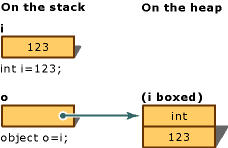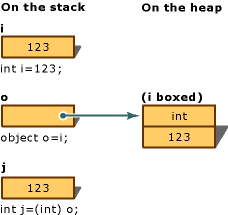這兩段程式碼看起來有差嗎?
var count = 0;
//1
Console.WriteLine($"Hello World {count}");
//2
Console.WriteLine($"Hello World {count.ToString()}");
雖然在程式碼結構上差異不大,但在內部的運作上,這兩者實際上有很大的差別。
下面是一個簡單實際執行的效能測試:
版本 : .NET Core 3.1
void Main()
{
var count = 1000000;
Case1Testing(count);
Case2Testing(count);
}
void Case1Testing(int count)
{
var st = new Stopwatch();
st.Start();
for (int i = 0; i < count; i++)
{
var str = $"Hello World {i.ToString()}";
}
st.Stop();
Console.WriteLine($"Case1 花費: {st.ElapsedMilliseconds}ms");
}
void Case2Testing(int count)
{
var st = new Stopwatch();
st.Start();
for (int i = 0; i < count; i++)
{
var str = $"Hello World {i}";
}
st.Stop();
Console.WriteLine($"Case2 花費: {st.ElapsedMilliseconds}ms");
}
//Output:
//Case1 花費: 48ms
//Case2 花費: 112ms
雖然看起來相差了兩倍,但實際上這是了一百萬次的結果,但為什麼會有這種差異呢?
這就是這篇文章的標題啦~ 「Boxing」與「Unboxing」
一般的Value Type是存在Stack,而Reference Type在Stack指向的位置是Heap的位址,所以在Valut Type需要轉換成Reference Type的時候就會觸發Boxing這個過程

var i = 123;
object o = i; //boxing
那Unboxing呢? 反過來將Reference Type轉換成Value Type就會發生

var i = 123;
object o = i; // boxing
var j = (int)o; // unboxing
在.NET官方有明確指出,boxing和unboxing是非常耗費運算資源的,因為在boxing時會需要建立一個新的箱子(物件),比單純Assign的速度多了整整20倍,而unboxing也比Assign多了4倍的時間。
所以基本上在有效能考量的程式裡面,需要盡量避免這種況狀發生。
第二個問題來了,剛剛有特別標註環境是 net core 3.0,如果換到6.0以後
void Main()
{
var count = 1000000;
Case1Testing(count);
Case2Testing(count);
}
void Case1Testing(int count)
{
var st = new Stopwatch();
st.Start();
for (int i = 0; i < count; i++)
{
var str = $"Hello World {i.ToString()}";
}
st.Stop();
Console.WriteLine($"Case1 花費: {st.ElapsedMilliseconds}ms");
}
void Case2Testing(int count)
{
var st = new Stopwatch();
st.Start();
for (int i = 0; i < count; i++)
{
var str = $"Hello World {i}";
}
st.Stop();
Console.WriteLine($"Case2 花費: {st.ElapsedMilliseconds}ms");
}
//Output:
//Case1 花費: 30ms
//Case2 花費: 47ms
為什麼會快這麼多?
其實是C# 10有對字串插補做效能改進
可以用LinqPad等其他工具看到net core 3.0 一開始被編譯出來的版本,是使用String.Format
//1
Case1Testing
Stopwatch st = new Stopwatch ();
st.Start ();
int i = 0;
while (i < count)
{
string.Concat ("Hello World ", i.ToString ());
i++;
}
st.Stop ();
Console.WriteLine (string.Format ("Case1 花費: {0}ms", st.ElapsedMilliseconds));
//2
Case2Testing
Stopwatch st = new Stopwatch ();
st.Start ();
int i = 0;
while (i < count)
{
string.Format ("Hello World {0}", i);
i++;
}
st.Stop ();
Console.WriteLine (string.Format ("Case2 花費: {0}ms", st.ElapsedMilliseconds));
但 6.0 C# 10的版本呢?
//1
Case1Testing
Stopwatch st = new Stopwatch ();
st.Start ();
int i = 0;
while (i < count)
{
string.Concat ("Hello World ", i.ToString ());
i++;
}
st.Stop ();
DefaultInterpolatedStringHandler defaultInterpolatedStringHandler = new DefaultInterpolatedStringHandler (12, 1);
defaultInterpolatedStringHandler.AppendLiteral ("Case1 花費: ");
defaultInterpolatedStringHandler.AppendFormatted (st.ElapsedMilliseconds);
defaultInterpolatedStringHandler.AppendLiteral ("ms");
Console.WriteLine (defaultInterpolatedStringHandler.ToStringAndClear ());
//2
Case2Testing
Stopwatch st = new Stopwatch ();
st.Start ();
int i = 0;
DefaultInterpolatedStringHandler defaultInterpolatedStringHandler;
while (i < count)
{
defaultInterpolatedStringHandler = new DefaultInterpolatedStringHandler (12, 1);
defaultInterpolatedStringHandler.AppendLiteral ("Hello World ");
defaultInterpolatedStringHandler.AppendFormatted (i);
defaultInterpolatedStringHandler.ToStringAndClear ();
i++;
}
st.Stop ();
defaultInterpolatedStringHandler = new DefaultInterpolatedStringHandler (12, 1);
defaultInterpolatedStringHandler.AppendLiteral ("Case2 花費: ");
defaultInterpolatedStringHandler.AppendFormatted (st.ElapsedMilliseconds);
defaultInterpolatedStringHandler.AppendLiteral ("ms");
Console.WriteLine (defaultInterpolatedStringHandler.ToStringAndClear ());
可以看到他改用了DefaultInterpolatedStringHandler 的方法,但我們只能知道他速度變快了,不曉得實際上對CPU和Memory的影響如何。
所以寫了一段壓力測試來跑跑看
void Main()
{
var summary = BenchmarkRunner.Run<StringBenchmarks>();
}
[MemoryDiagnoser]
public class StringBenchmarks
{
public int value = 0;
[GlobalSetup]
public void Setup()
{
}
[Benchmark(Description = "Interpolation Without ToString")]
public string StringInterpolationNoToString()
{
return $"Hello World {value}";
}
[Benchmark(Description = "Interpolation With ToString")]
public string StringInterpolationToString()
{
return $"Hello World {value.ToString()}";
}
[Benchmark(Description = "String.Format Without ToString")]
public string StringFormat()
{
return string.Format("Hello World {0}", value);
}
[Benchmark(Description = "String.Format With ToString")]
public string StringFormatToString()
{
return string.Format("Hello World {0}", value.ToString());
}
}
Output:
// * Summary *
BenchmarkDotNet=v0.13.5, OS=Windows 11 (10.0.22621.1848/22H2/2022Update/SunValley2)
AMD Ryzen 7 3800X, 1 CPU, 16 logical and 8 physical cores
.NET SDK=7.0.302
[Host] : .NET Core 3.1.32 (CoreCLR 4.700.22.55902, CoreFX 4.700.22.56512), X64 RyuJIT AVX2
| Method | Mean | Error | StdDev | Gen0 | Gen1 | Allocated |
|--------------------------------- |----------:|---------:|---------:|-------:|-------:|----------:|
| 'Interpolation Without ToString' | 113.37 ns | 0.485 ns | 0.454 ns | 0.0086 | - | 72 B |
| 'Interpolation With ToString' | 31.18 ns | 0.670 ns | 1.306 ns | 0.0057 | - | 48 B |
| 'String.Format Without ToString' | 116.08 ns | 2.237 ns | 2.198 ns | 0.0086 | - | 72 B |
| 'String.Format With ToString' | 122.94 ns | 2.388 ns | 5.859 ns | 0.0057 | 0.0002 | 48 B |
// * Summary *
BenchmarkDotNet=v0.13.5, OS=Windows 11 (10.0.22621.1848/22H2/2022Update/SunValley2)
AMD Ryzen 7 3800X, 1 CPU, 16 logical and 8 physical cores
.NET SDK=7.0.302
[Host] : .NET 6.0.18 (6.0.1823.26907), X64 RyuJIT AVX2
| Method | Mean | Error | StdDev | Gen0 | Allocated |
|--------------------------------- |---------:|---------:|---------:|-------:|----------:|
| 'Interpolation Without ToString' | 39.14 ns | 0.318 ns | 0.281 ns | 0.0057 | 48 B |
| 'Interpolation With ToString' | 15.81 ns | 0.334 ns | 0.610 ns | 0.0057 | 48 B |
| 'String.Format Without ToString' | 46.94 ns | 0.361 ns | 0.320 ns | 0.0086 | 72 B |
| 'String.Format With ToString' | 46.63 ns | 0.434 ns | 0.362 ns | 0.0057 | 48 B |
可以看到共通點就是StringFormat還是比較慢啦,但明顯也跟著版本更新速度變快了。 而字串插捕加上手動避免boxing的僅僅只有15.81ns,但Memory的分配看起來都差不多,推測是因為字串太單純,導致不太明顯,所以更改了以下的壓測程式碼
void Main()
{
var summary = BenchmarkRunner.Run<StringBenchmarks>();
}
[MemoryDiagnoser]
public class StringBenchmarks
{
public int value = 1234567890;
[GlobalSetup]
public void Setup()
{
}
[Benchmark(Description = "Interpolation Without ToString")]
public string StringInterpolationNoToString()
{
return $"Hello World {value} {value} {value} {value} {value}";
}
[Benchmark(Description = "Interpolation With ToString")]
public string StringInterpolationToString()
{
return $"Hello World {value.ToString()}{value.ToString()}{value.ToString()}{value.ToString()}{value.ToString()}";
}
[Benchmark(Description = "String.Format Without ToString")]
public string StringFormat()
{
return string.Format("Hello World {0}{1}{2}{3}{4}", value,value,value,value,value);
}
[Benchmark(Description = "String.Format With ToString")]
public string StringFormatToString()
{
return string.Format("Hello World {0}{1}{2}{3}{4}", value.ToString(),value.ToString(),value.ToString(),value.ToString(),value.ToString());
}
}
Output:
// * Summary *
BenchmarkDotNet=v0.13.5, OS=Windows 11 (10.0.22621.1848/22H2/2022Update/SunValley2)
AMD Ryzen 7 3800X, 1 CPU, 16 logical and 8 physical cores
.NET SDK=7.0.302
[Host] : .NET Core 3.1.32 (CoreCLR 4.700.22.55902, CoreFX 4.700.22.56512), X64 RyuJIT AVX2
| Method | Mean | Error | StdDev | Gen0 | Gen1 | Allocated |
|--------------------------------- |---------:|--------:|---------:|-------:|-------:|----------:|
| 'Interpolation Without ToString' | 368.3 ns | 6.71 ns | 8.23 ns | 0.0410 | - | 344 B |
| 'Interpolation With ToString' | 208.2 ns | 3.16 ns | 4.83 ns | 0.0553 | 0.0002 | 464 B |
| 'String.Format Without ToString' | 342.5 ns | 6.86 ns | 14.77 ns | 0.0401 | - | 336 B |
| 'String.Format With ToString' | 394.1 ns | 3.82 ns | 3.57 ns | 0.0544 | 0.0005 | 456 B |
// * Summary *
BenchmarkDotNet=v0.13.5, OS=Windows 11 (10.0.22621.1848/22H2/2022Update/SunValley2)
AMD Ryzen 7 3800X, 1 CPU, 16 logical and 8 physical cores
.NET SDK=7.0.302
[Host] : .NET 6.0.18 (6.0.1823.26907), X64 RyuJIT AVX2
| Method | Mean | Error | StdDev | Gen0 | Allocated |
|--------------------------------- |---------:|--------:|--------:|-------:|----------:|
| 'Interpolation Without ToString' | 124.9 ns | 2.51 ns | 4.65 ns | 0.0191 | 160 B |
| 'Interpolation With ToString' | 143.6 ns | 2.92 ns | 6.66 ns | 0.0467 | 392 B |
| 'String.Format Without ToString' | 197.3 ns | 3.86 ns | 4.45 ns | 0.0401 | 336 B |
| 'String.Format With ToString' | 267.3 ns | 3.37 ns | 3.15 ns | 0.0544 | 456 B |
這樣差距就有出來了,可以發現在 .Net 6 插補字串 ToSting()避免boxing會比不ToString()多分配了將近兩倍的記憶體,但只快了19ns左右,雖然這些都微乎其微,真正有需要的時候可以列入考量。
Reference:
https://learn.microsoft.com/zh-tw/dotnet/framework/performance/performance-tips?WT.mc_id=DT-MVP-4015686 https://learn.microsoft.com/zh-tw/dotnet/csharp/programming-guide/types/boxing-and-unboxing?WT.mc_id=DT-MVP015686
